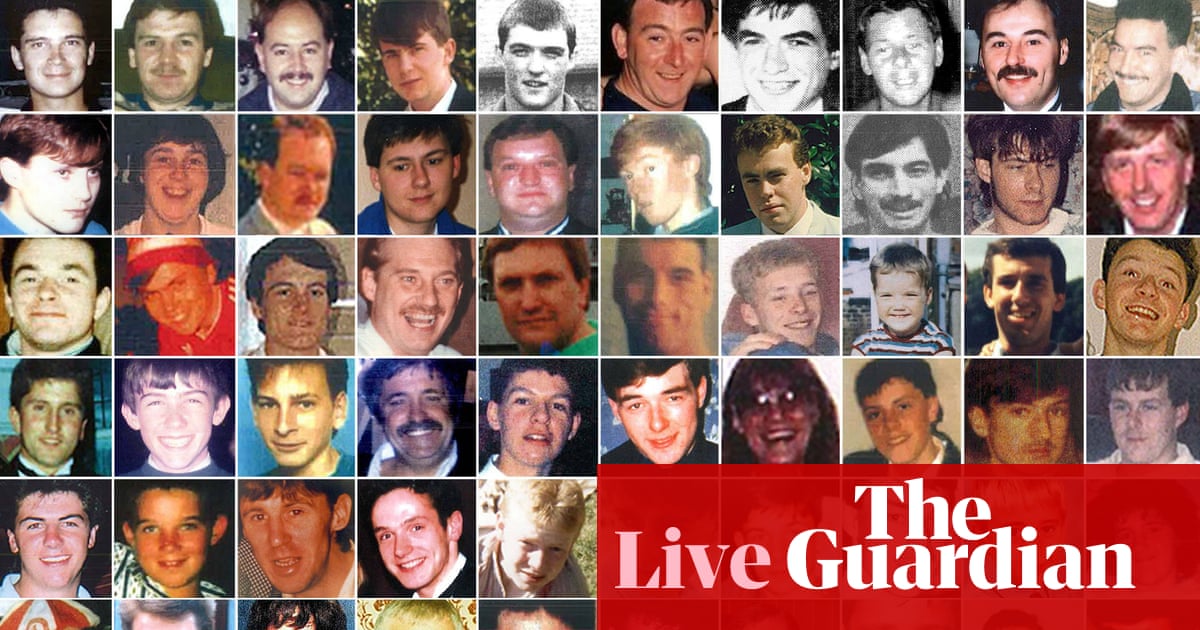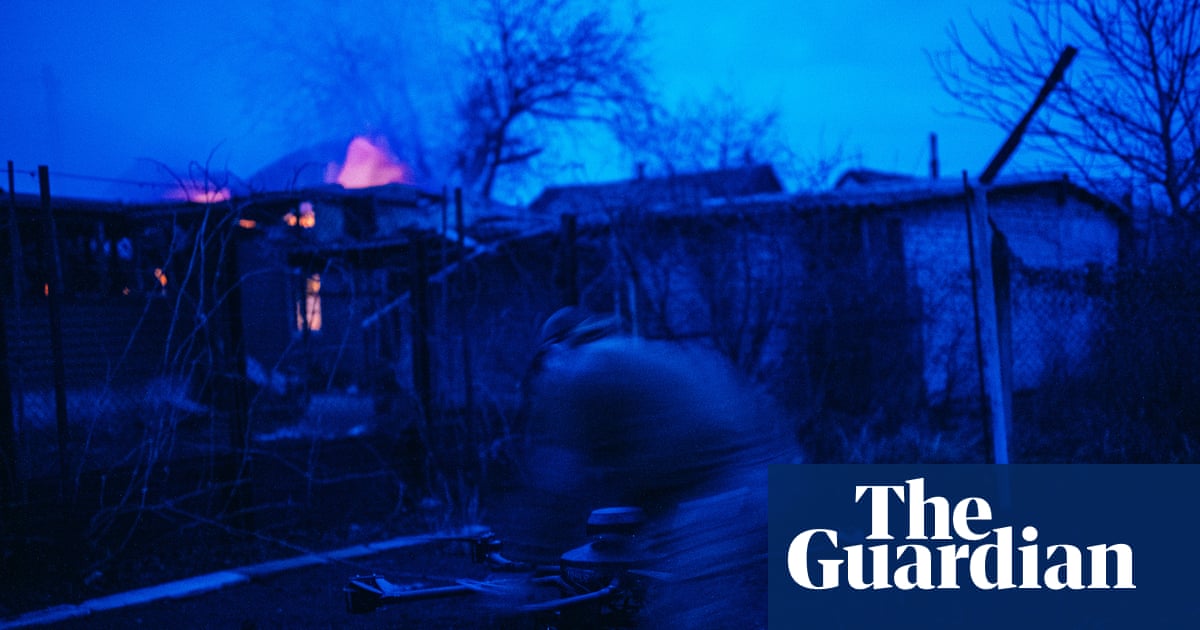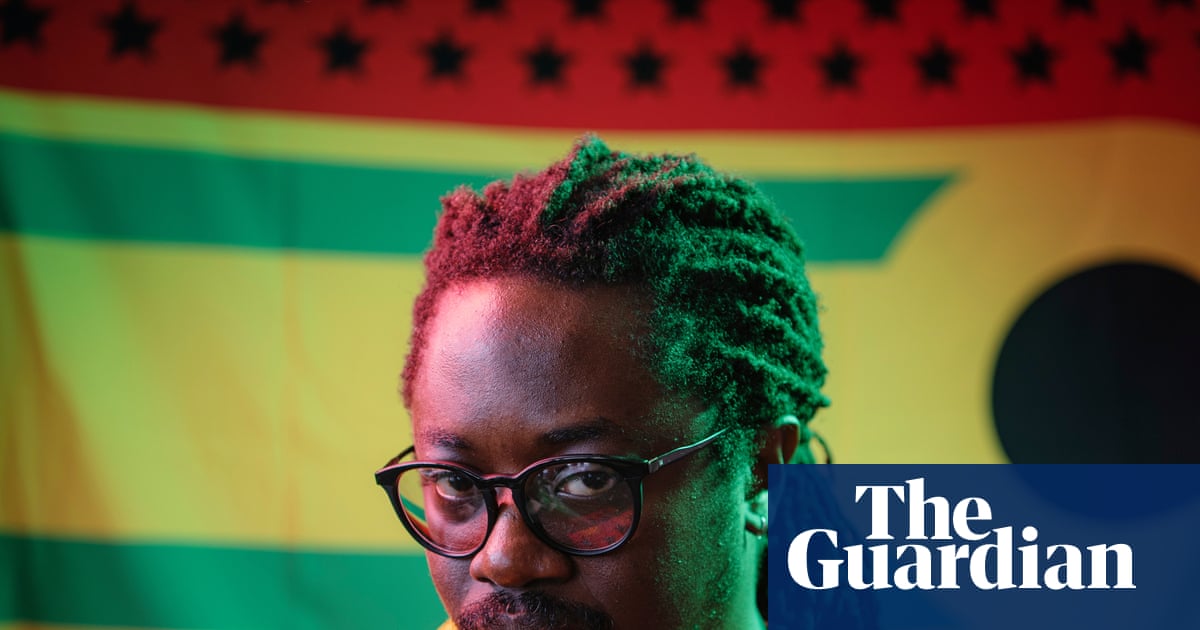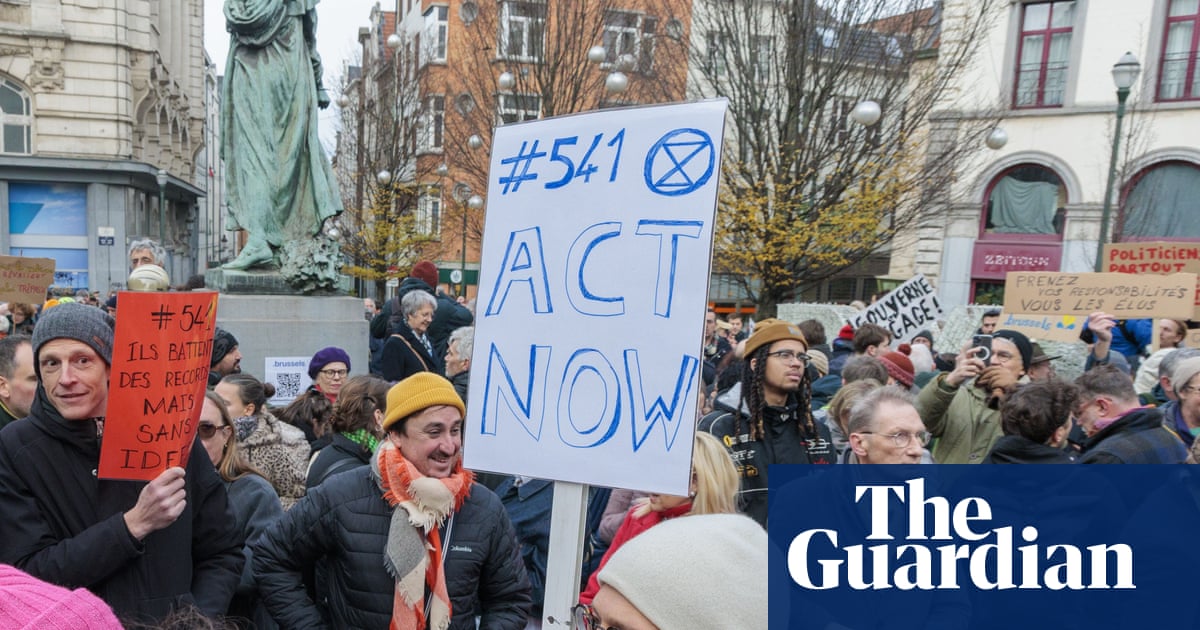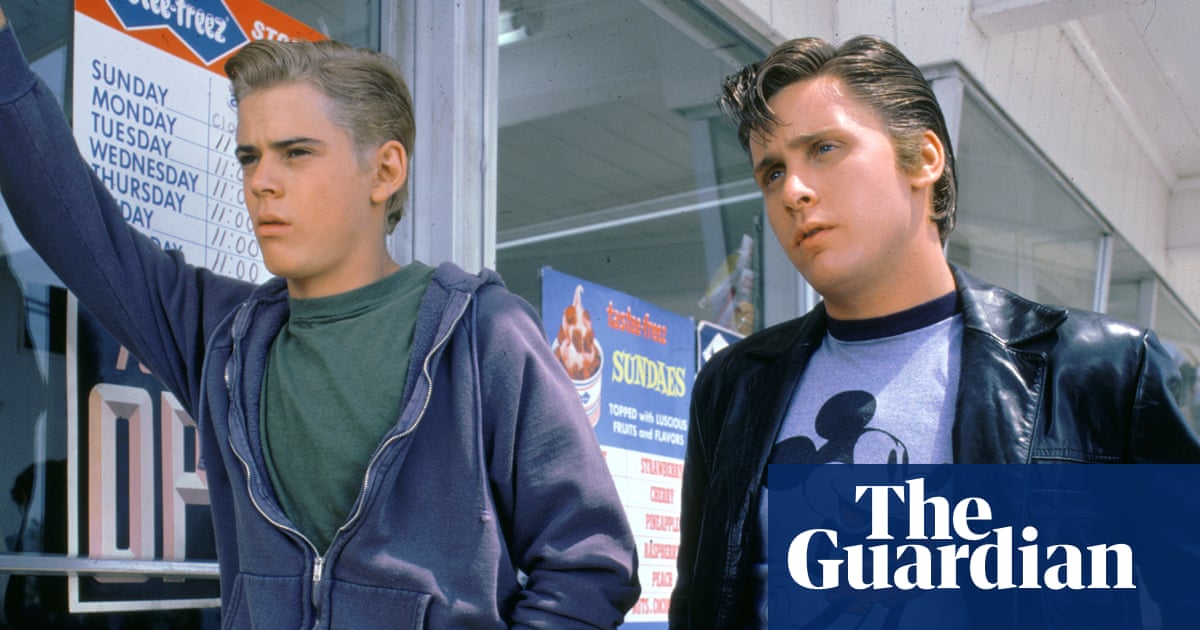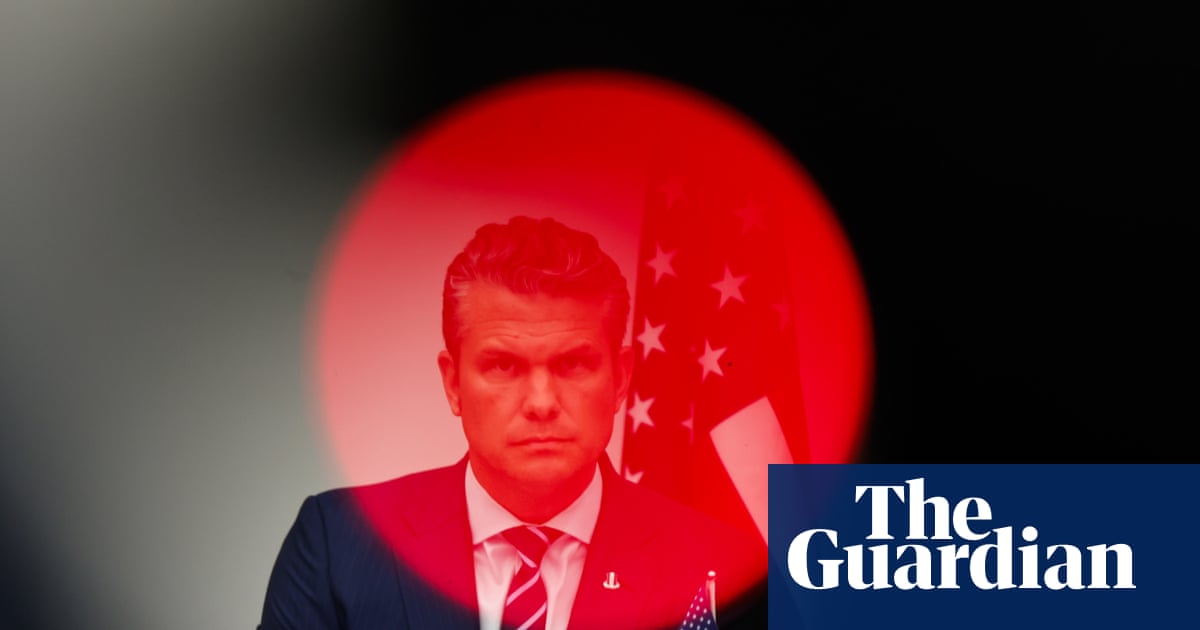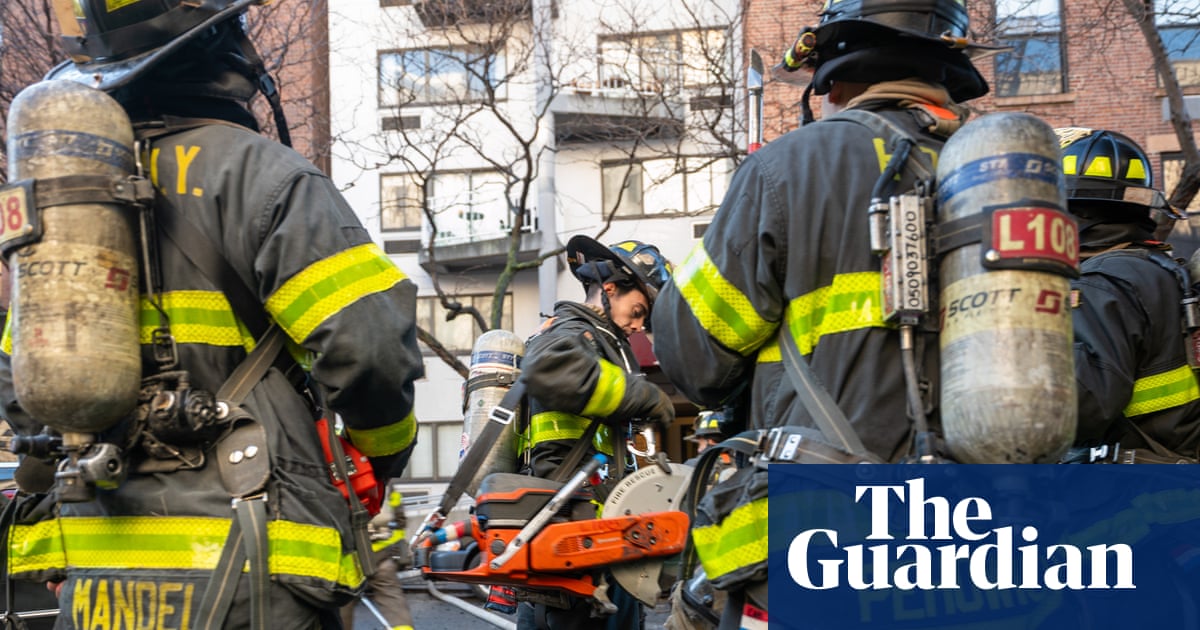Marina Abramović is sitting in a rehearsal studio in Manchester, tucking into lamb chops and ajvar. The latter is a red pepper and garlic relish, hailing from the Balkans. “It’s homemade,” she says, given to her by a friend. Her Irish assistant, Declan, who cooked the lamb, bustles around her amicably. Abramović is amicable too, offering me the chops and lathering ajvar on to a rice cake for me to taste (delicious).
It is a disarmingly cosy welcome from the high priestess of performance art. Then again, this might be the quiet before the storm. Her new show, Balkan Erotic Epic, a four-hour performance conceived and directed by Abramović and commissioned by Factory International, may ruffle some feathers. More than 70 actors, dancers and local performers will feature in 13 scenes that enact ancient ritual, rites and folklore from Slavic tradition. Many contain nudity and act out explicit eroticism that arises out of the tales collected from Albania, Romania, Bulgaria, North Macedonia, Montenegro, Greece, Turkey, Serbia, and more.
“I found out,” she says, “that these ancient rituals for farming, for childbirth, for weddings, for funerals, with absolutely no exception, used the genitals – the vagina and the penis – in so many different ways.” Screens, film, music and animation will accompany live performance and fill the monumental 64-metre long, 21-metre high dimensions of Aviva Studios.
It is the most important project of her life, she says, with an aim to rediscover the past and our present selves through it. It is significant for Aviva Studios, too. John McGrath, its artistic director, says the venue was partly built with Abramović in mind. “When we were developing the building, she was right at the top of our list. We felt she could do something amazing here.”
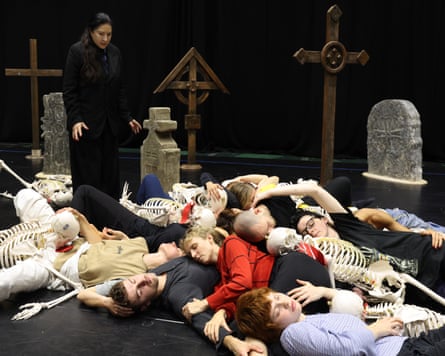
Initially, she proposed a collaboration with Lady Gaga, but that changed after an emergency meeting in which she introduced this idea. Is Abramović scared by its maximalist scale? “Oh my God! First of all, my works are very minimal. This is not minimal. I’ve never done anything so complex, so daring … I wake up in the middle of the night. I’ve never been like this for any other work.”
That’s saying something for an artist who in previous works has had a bow-and-arrow aimed at her heart by her former partner, the artist Ulay, lost consciousness inside a burning wooden star and famously sat in the same chair for 700 hours at New York’s MoMA. And those are just some of her gruelling exercises in pain and endurance.
This show is clearly personal for Abramović, who was born and raised in former Yugoslavia, now Serbia. It begins with the funeral of its one-time communist leader Josip Broz Tito and ends with wedding revelries. There is a world of ritual in between, from filmed clips of women beating their breasts in mourning to dancing skeletons and a giant orgy.
There will be Albanian warrior women alongside men “penetrating” the soil as part of a fertility rite, and a homoerotic dance between an Albanian and Serbian (politically, they are “mutual enemies”) while a pregnant woman will be soaked in milk, in keeping with Romany ritual. There will also be a “mushroom garden” populated by five-metre penises growing out of the ground. Abramović shows me a miniature picture of it and points to a phallus resembling a long thin neck: “We call that one Giacometti.”
Nearly 79, the artist is warm and delightfully unboundaried, linking arms as we walk, looking ageless in head-to-toe black, with gleaming red nails and a pale-skinned glamour. Will her body be part of this piece? “I don’t promise anything: maybe, maybe not.” She will introduce the show to audiences each night, but beyond that, she admits, “I find it extremely difficult to direct and be a part of it at the same time.”
Is she worried that a British audience will find it all terribly embarrassing, or be scandalised? She has had a taste of that already – in 2023, when Imponderabilia, featuring a naked couple in a doorway, was staged as part of her retrospective at the Royal Academy in London (re-enacted from 1977 when she conceived it with Ulay). It was all the tabloids could talk about, she says, rather than the meaning of the work itself. Yet, at the same time, “nakedness brings so much power because people are scared, interested, amused and intrigued. So I accept an audience seeing this over four hours will have lots of different emotions. They will be shocked, amused because there’s humour in it, disturbed, and they will be emotional.”
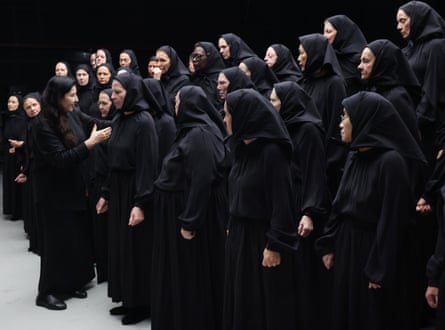
A rehearsal of a funeral scene contains just this churn of emotions as a dead, naked man is slowly dressed by a woman while an ensemble dances to a Serbian lament. It weaves grief – wailing and sobbing – with romance and erotica, as do other scenes in the show (the orgy has skeletons writhing between living bodies).
To those who might equate it to pornography, Abramović would say it is emphatically not. It is too elemental, and earnest, for that. Female performers have even been asked not to shave their underarm and pubic hair for three months beforehand. “For me, these rituals deal with the history of human beings. It’s about humanity, not about pornography. That’s incredibly important.” Still, she says, “I expect a lot of criticism because it’s so easy to criticise. But that just proves the point that we don’t even accept our own history: I didn’t invent any of these rituals.”
The idea for the show was in fact a reaction against the blank-faced performance of sex that pornography offers. In 2006, she made a short movie for a film anthology called Destricted. It featured myths from the Balkans in animated form. She was asked to create a piece about pornography in art after this. “So I started looking at pornos and I found them incredibly boring and repetitive. They had absolutely no substance. I gave up the whole idea and went back into mythology within Slavic culture.”
Whatever the tabloids may say, Abramović is excited. Her tone is low-key, her humour deadpan, but she begins to bubble with enthusiasm as she talks. “Let me just show you this,” she says, opening file after file on her laptop, flicking up image upon image.
There is canny branding alongside the heartfelt exuberance, with accompanying merchandise ready to go. Declan splays open white T-shirts with tastefully sketched breasts on them, along with baseball caps and aprons dotted with black-and-white willies. They are vaguely comic and so cutely inoffensive that I am tempted to ask Declan if he accepts credit card payments.
There were certain rituals that couldn’t be performed as part of the show, though, because “they would be crossing all the borders”. Those stories are not excised altogether but told through animation, Abramović explains. So there is a story from 14th-century Croatia that involves a wife putting a fish into her vagina overnight to make a love potion; and, from 14th-century Bosnia, a wedding day ritual to protect against impotence in which a groom makes three holes in a bridge, penetrating each one with his penis.
What has led her to create this work now, in a world of so much political tumult, from Ukraine – a war she has publicly criticised – to Gaza, Trump, Putin and Netanyahu. “We have hell,” she says. “That’s why this is so important. I want to go back to the roots of everything. When I went to Glastonbury [to lead seven minutes of silence, en masse, from the Pyramid stage in 2024] everyone told me it was crazy and that no one would do it. But I knew that this was what we needed. The only way to change the world is to change ourselves. But for that, we have to look into our pasts.”
Abramović lived in Amsterdam with Ulay for several years before relocating to New York. She does not regret leaving Europe. “There was no stimulus in Amsterdam, even Van Gogh left Amsterdam! I need places with trouble, because then I have a reason [to create art].” And while her work is not always overtly political, it often relates to the current moment.
Right now, the US feels “totally divided … There could be civil war,” she says. So if anything can be said or done through art, she is there to do it. “I don’t think art can change the world, but it can definitely contribute in opening the consciousness and asking the right questions. That’s my function.”
This work, in which sex and the genitals are shown to play a vital part in community life, may even be healing for our time, she suggests. Because, however much guilt religion imposes on the flesh, sexual and reproductive energy is not an opposing force to spirituality for Abramović. “It is the only energy we have in our bodies. This energy can turn into violence, into aggression, but also into tenderness and love. That is what I’m exploring here.”
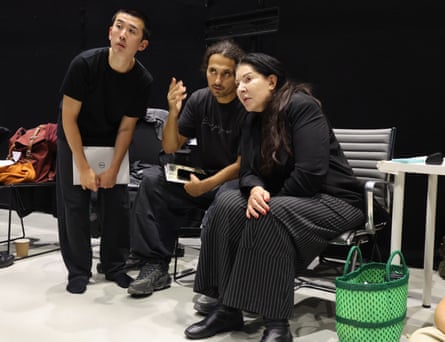
Born a year after the end of the second world war, she was partly raised by her grandmother, who was a deeply religious Orthodox Christian, as was her mother. The latter was a keen supporter of Tito’s regime and strict with her daughter. “I lost my virginity at 24 years old. My mother said that sex was dirty. I was not able to go anywhere … So I needed to rebel. I needed to find out, ‘Who am I?’ I wanted to know all the possibilities of the body and mind – how the body, mind and soul is connected.”
The show gathers another layer of intimacy because Abramović has inserted her mother into it, albeit as a fictional character. She emerges in communist uniform – a national hero and decorated army major, ever present, weaving among the 13 scenes, silent and aloof, until she arrives at a scene involving drinking, dancing and nakedness. “She gets more interested, starts dancing and taking off her clothes. Liberating my mother is something I couldn’t do in life, so I’m doing it in this work.”
Was her mother proud of her? “It’s so complicated. When I sent her cuttings of my work, she cut out every single page of nudity before showing other people, so 360 pages became about 72 pages. She was thinking I was completely wild and she’d lost control of me.”
Abramović only found out the extent of her mother’s admiration for her when she found her diaries after she died, having had dementia. “If I had read one page of her diary while she was alive, my life would have been different with her. She wanted to make me a warrior. She never kissed me my entire life. Ever. I asked her one day, at 40, why. She said she didn’t want to spoil me.”
She intends to celebrate her 80th birthday when this show travels to the Park Avenue Armory in New York next year. She will throw a gigantic party amid the bare-breasted women and outsized phalluses. “I hope Trump doesn’t come to see the nakedness,” she jokes. But seriously, she will invite everybody who means something to her. “I had a difficult life, I had a good life, I had a more interesting life than I could possibly have imagined. So I want to embrace that moment.”
And after that? Well, her diary is fully booked until 2029 and she has just had a knee replacement. She rolls up her trousers to reveal a long white scar. A German film-maker recently called her up, wanting to make a retrospective of her life, on her 80th. “I said no,” she says, deadpan. “It’s too early for that.”

 2 months ago
71
2 months ago
71
